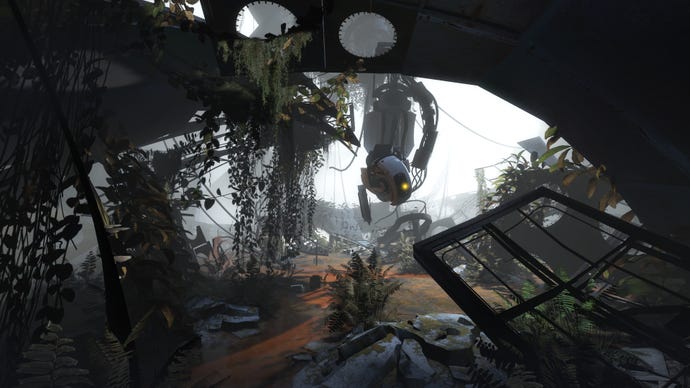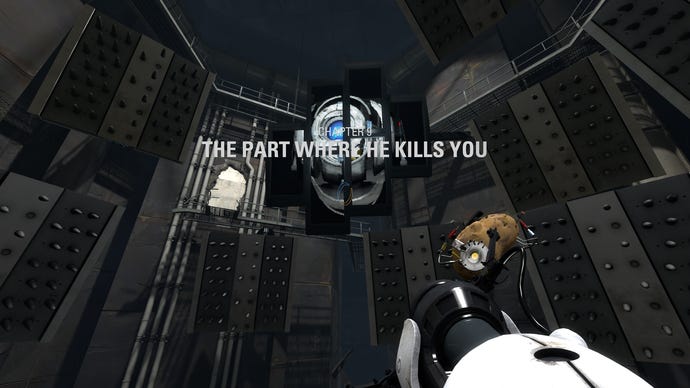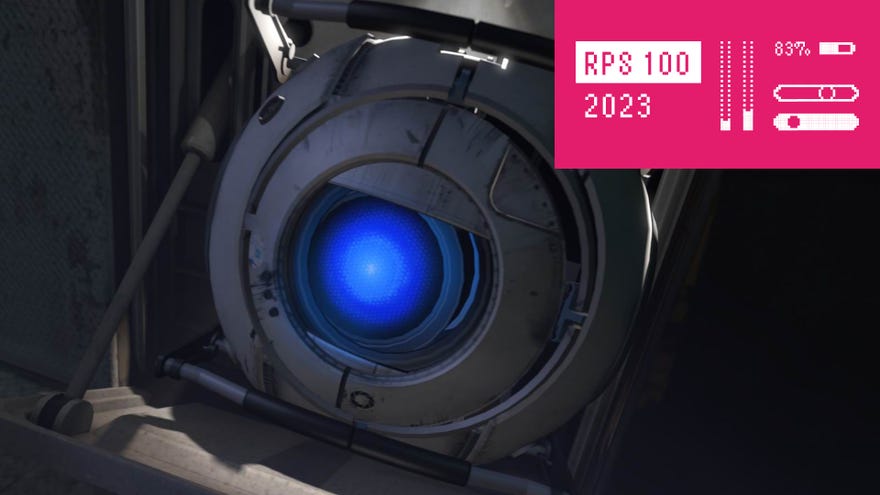Professional weird little guy Wheatley distills everything I love about Portal 2
He's awful, but also really great
How does one make a sequel to a basically perfect game? 2007's physics-platformer-in-a-weird-science-facility Portal is a lodestar piece of game design from top to bottom. It's one of my favourite games, and I went into 2011's Portal 2 with many a reservation. But it's very good! And there are so many things I love about Portal 2 that it's quite hard to pick just one thing to write about.
I could do "the joy of Portal 2's retro science", where you fall through the floor into the old school Aperture Science labs and see the 60s-ish version of all the big buttons and testing chambers you were put through in the first Portal. I could do "the joy of the corrupted personality cores in Portal 2", a group of corrupted AI spheres including Rick The Adventure Sphere, which is largely just Nolan North making up his own action theme song. I could even do "the joy of potatoes in Portal 2". And then I realised that most of the things I like about Portal 2 also intersect with Stephen Merchant's character Wheatley, a weird little guy (in the most pejorative sense).

Wheatley is a personality core who first wakes you up at the start of Portal 2 and helps you on your way to defeat the malignant AI GLaDOS, who you already defeated in the first game and must now defeat again because you and Wheatley accidentally turn her back on trying to escape the facility. Wheatley is the only video game character Merchant has ever voiced, and I have a lot of respect for him for that. I assume what happened is that he went, "Well I just delivered one of the best voice acting performances in all of games, so I'll probably knock it on the head now."
Spoilers from here on out, but once you plug Wheatley into the system and give him control of, well, everything in the facility, the sudden power makes him go evil in roughly same amout of time it takes for me to eat a Walnut Whip (< 10 seconds, like a snake eating a bird egg). It means Merchant has to go from nervous and inept to egomaniacal and inept in the space of one escalatingly evil laugh. And he's so good at both versions of Wheatley! I imagine Nolan North and Troy Baker met up to drink a couple of fingers of whiskey, hands trembling, when it became clear that Merchant wasn't going to do any more work in video games.
But. Merchant's performance only works in the whole context of the game. The writing is superb, both line to line (one of my favourite bits is where he attempts to tell a sort of ghost story: "They say the old caretaker of this place went absolutely crazy. Chopped up his entire staff. Of robots.") and in the overarching story, themes, art and design. Wheatley is, even when all powerful, fundamentally incompetent, and his heel turn is what sets you up to bond with GLaDOS as you explore the lower, older areas of Aperture Science.

Remember how there was an extended Wheatley bit near the start, where he comments on a children's science competition being all potato batteries? And that these children are probably not the children of scientists, and so are basically inferior? This doesn't just lay the foundation for Wheatley becoming the antagonist (i.e. he's actually not very nice underneath his layer of initial helpfulness), but it also foreshadows the ironic set of events that involves him sticking GLaDOS into one of those potato batteries, and how you and your once AI nemesis go and then discover even more old science from before GLaDOS and Wheatley were even made, and use it to defeat him.
It's here where Portal 2 builds on the first game, too, adding new surface types in gels: propulsion gel to speed you up as you move on it, and repulsion gel to make you and other things bounce. There's a white gel I think of as moon juice that allows you to place portals on surfaces you couldn't before. And the way you place these gels involves physics too, so it's puzzles all the way down.
The gels, along with things like the big square buttons with black and yellow warning tape around them, are a messier, more hands on, more analogue version of the science you saw and participated in in the first Portal. Viewing Wheatley in context after this, you see an old company that was developing, contrasted with a company that thought it was a good idea to make a mean-spirited loser AI to fix the homicidal AI they already accidentally made, like the old lady swallowing different animals. But a large part of Portal 2 is learning that we shouldn't underestimate the potato - or, indeed, non-science types like Caroline, the former assisstant who became the core of GLaDOS's conscience. Because otherwise you're Wheatley.

